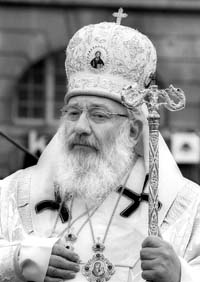“We Have Preserved Our Identity”

As The Day has already reported, the Vatican’s Cardinal Walter Kasper met top hierarchs of the Russian Orthodox Church, including Patriarch Aleksiy II of Moscow, late last month. As a result of these contacts, the Vatican will perhaps backtrack — under the pressure of Russian church dignitaries — on the decision to grant the status of a patriarchate to the Ukrainian Greek Catholic Church (UGCC). This follows from, above all, the statement Cardinal Kasper made in Rome on his return from Moscow. The prelate thinks “we must not break the ties Pope John Paul II established with Orthodox churches.” (It was reported that on the eve of Cardinal Kasper’s visit to Moscow all the fourteen canonical churches of the Orthodox world had opposed in categorical and uncompromising terms the establishment of the UGCC patriarchate. Moreover, even before the most recent events, Cardinal Kasper was known as an opponent of the Greek Catholic patriarchate.)
Yet, it is Pope John Paul II who must make the final decision in the Vatican. Walter Kasper believes this should be done in the immediate future in order “to mute the discontent” of the Greek Catholics. Meanwhile, the latter are convinced they have a natural right to found a patriarchate and become a canonical church with headquarters in Kyiv. This is why the church is now full of despair and bitterness. In this connection, UGCC leader, Cardinal Huzar, and the Synod of Kyiv and Halychyna Bishops have delivered an address to the clergy, monks, and laity. Cardinal Huzar said, among other things, “The recent visit of Cardinal Walter Kasper to Moscow, during with the parties also discussed the affairs of our church, including recognition of the UGCC patriarchate, has stirred up controversy not only in this country but also throughout the world. The fact that the internal affairs of our church were discussed not in Kyiv, Lviv, or Rome but in Moscow and, in addition, without our participation has alarmed or even outraged many Greek Catholics...
“The UGCC has not only a rich and long history dating back to the times of Volodymyr’s baptism but also maintains and develops its ancient theological, legal, and spiritual tradition, and has a streamlined hierarchy of its own. Under church law, the Ukrainian Greek Catholic Church is autocephalous, rather than part of some other church.
“There were so many difficult periods in the history of our church, when it was denied the right to exist, when attempts were made to oust it from our native land, destroy it physically or apply tough administrative measures to make it gradually cease to exist. Despite all these cruel measures, we have survived and preserved our identity. The idea of Kyiv church patriarchate emerged as long ago as in the seventeenth and eighteenth centuries, when farsighted clergy wanted to unite all Ukrainian Christians into one church in the shape of a patriarchate. This idea was clearly spelt out in the 1960s by Patriarch Yosyp Slipyi at the Second Vatican Council. The same attitude was taken by all bishops of our church at the Synod session in 2002, and we are now looking forward to this idea being accepted by His Holiness.
“Since the very beginning of his pontificate, Pope John Paul II has interceded for our church, thus showing how close it is to his heart. In communist times, Vatican representatives defended, on instructions from the Pope, our right to exist. After the collapse of the Soviet Union, Pope John Paul II extolled our bishops, who had worked clandestinely, and encouraged the development of our church. Recently, in 2002, in spite of all kinds of protests, the Pope visited Ukraine and more than once addressed his pastoral word to us...”
Cardinal Huzar also recalled that in 2003 Cardinal Walter Kasper presented, on papal instructions, the case of the Greek Catholic Church to the Moscow Patriarchate. “That was a delicate gesture on the Pope’s part, for he had informed Moscow about the likely recognition of the UGCC patriarchate beforehand out of courtesy.” (This is what the Moscow Patriarchate insists upon in its relations with “other Christians” and “other faiths.”) Yet, this courteousness yielded no result, while the above-mentioned letters from the world’s canonical Orthodox churches sometimes contained expressions “inadmissible in interfaith dialog.” (They particularly pointed out a “gradually decreasing presence” of the Greek Catholic Church.)
Cardinal Huzar thinks that the Moscow Patriarchate’s ultimatum- like warnings about a complete break of relations between the Catholics and the Orthodox “for years to come” should the Pope recognize the UGCC patriarchate “border on blackmail... This kind of reaction is an unpleasant surprise, for it shows that the Orthodox hierarchy is unprepared to address historical problems by taking into account the legitimate needs of all the interested parties. We hope that the constructive-minded Orthodox circles will eventually say their own word. For ecumenism must show itself in concrete and longtime actions that reflect the good will of partners.”
A large group of Verkhovna Rada members headed by People’s Deputy Hudyma have voiced their support for the UGCC. They have decided to send a delegation to the Vatican to hand the Pope a petition requesting him to grant patriarchate status to the UGCC. Mr. Hudyma also called upon Greek Catholics to write individual request letters to John Paul II. Should the Vatican not accept the patriarchate, the church must, in Mr. Hudyma’s opinion, proclaim it by itself.
The impression still is the Vatican will freeze the issue of Greek Catholic patriarchate and not only out of higher ecumenical considerations. Among many other reasons is, first of all, a desire to ensure the normal existence and development of Roman Catholic dioceses in Russia. This is the Vatican’s strategic vector.






